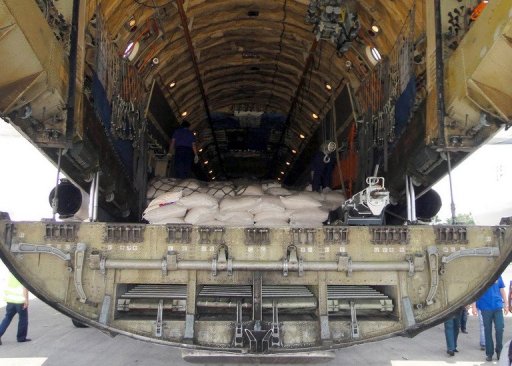US forces are readying to strike Syria, though the West insists its goal is not regime change but to punish President Bashar al-Assad’s government for unleashing chemical warfare on civilians.
The ground for a military intervention was laid out by US Vice President Joe Biden, who for the first time said last week’s attack, thought to have killed hundreds, could only have been perpetrated by Assad’s forces.
But the onrushing likelihood of action within days was met with defiance in Damascus, with regime officials pledging to fight any attack with “surprise” measures, while Syrian allies Russia and Iran warned of dire consequences.
But Britain and France also moved to back the use of force in Syria, while the White House promised to provide declassified evidence this week to prove that last Wednesday’s chemical attack was the work of regime forces.
The economic cost also started to be counted, as global stocks dived and world oil prices hit a six-month high.
Analysts expect to see cruise missiles launched from US and allied submarines, ships and possibly planes, firing into Syria from outside its waters and airspace.
Biden said an “essential international norm” had been violated in Syria.
During a news conference earlier Tuesday, Syria’s Foreign Minister Walid Muallem said Damascus would defend itself.
US Defense Secretary Chuck Hagel said the American military was already prepared to act if President Barack Obama gave the order — though White House aides said no final decision had been taken.
French President Francois Hollande said his country was “ready to punish” those behind the chemical attacks and that he would meet the Syrian opposition’s leader Thursday.
In London, Prime Minister David Cameron recalled parliament to discuss the crisis and slammed Syria’s use of chemical weapons as “morally indefensible.”
The White House said that any US action would be to defend the principle that chemical weapons should not be used — and would not aim to topple Assad, despite previous calls for him to go.
Carney refused to say whether Washington would seek a UN Security Council mandate for action, despite the likelihood of a Russian veto.
A military campaign in Syria is expected to be limited in scope, likely to last only several days and to target military sites but not the chemical weapons stocks themselves, sources in Washington said.
An opposition Syrian National Coalition official said in Beirut that the group expects a Western military intervention and it has been consulted over targets, which included airports, military bases and arms depots.
The White House, meanwhile, said Obama had called British Premier Cameron on Tuesday to discuss the Syria crisis, their second call in as many days. The US president has also spoken to the leaders of Australia, Canada and France.
Cameron’s deputy Nick Clegg echoed US assurances about not seeking regime change. The Arab League meanwhile put the “entire responsibility” for the “horrible crime” in Syria on Assad’s government.
The regime has denied it fired chemical weapons into the Damascus suburb, killing many of the victims in their beds. It says the rebels battling Assad in a vicious civil war are responsible.
Syria’s ally Moscow maintained its stance against military action.
Deputy Prime Minister Dmitry Rogozin, said on Twitter that: “The West behaves towards the Islamic world like a monkey with a grenade.”
Iran, Syria’s main regional ally, said Western action would threaten the stability and security of the region.
But another key regional power Turkey, said the chemical attack was a “crime against humanity” that “cannot go unpunished.”
Amid fears of reprisals for any Western attack, Israeli Prime Minister Benjamin Netanyahu vowed a fierce retaliation if his country came under fire.
Increasing signs of impending military action hit global stock markets.
Most European equities fell sharply as investors ignored solid data from Germany and nervously eyed Syria, sending the price of safe-haven gold soaring.
Oil prices soared, with Brent crude striking six-month highs on supply concerns.

COMMENTS
Please let us know if you're having issues with commenting.